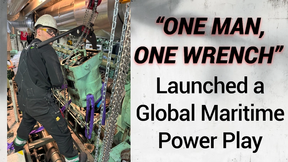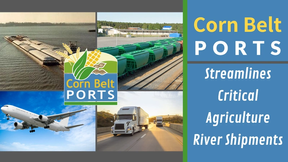Ports strive to meet growing demands / Bigger Ships, Volumes, call for Expanding Facilities and Infrastructure
Every port is different. But the harbor masters meeting in Vancouver this week are finding they all have much in common. “We all are dealing with issues of efficiency, the environment, and security and how to develop our ports to best accommodate our customers today and in the future,” says Capt. Kevin Richardson, president of the International Harbour Masters’ Association (IHMA) and a retired chief harbor master at the Port of Dover in the U.K. The congress is being hosted by the Port of Vancouver, Canada’s largest port, and the third largest in North America by tonnage.
The association was an outgrowth of the European Harbor Masters Association, but is now truly a global association, with members in attendance from ports in Canada, South Africa, Brazil, New Zealand, Australia, Russia, Bahrain, Oman and many more countries. There were no harbor masters from the U.S. present.
IHMA has held their congress every two years since the first was held in Reykjavik, Iceland, in 1996.
“Our purpose is to unite those responsible for the safe, secure, efficient and environmentally sound conduct of marine operations in port waters into one professional body to further the objectives of IHMA,” Richardson says. “As commerce and the ports grow, the port authorities and harbor masters must ensure that present and future operations are safe, secure, efficient and reliable.”
The theme for this year’s conference is port expansion, a challenge facing many ports. With larger vessels now transiting the Suez and Panama Canals, ports are expecting more and larger ships and the cargo volumes that go with them. According to Capt. Tom Corsie, vice president of real estate for the Port of Vancouver, port expansion must focus on growth and sustainability. “Our goal is economic prosperity, healthy environments and thriving communities. We report to the Ministry of Transport, but we work for the benefit of all Canadians.”
Each port must comply with its own unique governance and regulations, often with multiple jurisdictions. Vancouver, as an example, must navigate the authorities of the federal government, provincial, local municipalities and tribal entities. While the ports derive their authority to operate from various laws and regulations, they also agreed that much of what they are able to accomplish is based on the “social license” granted by willing communities, stakeholders and public opinion. The IMHA 10th biennial congress is significant in that it is the first time the event is being held in North America, says Tina Karas, general manager for transport and healthcare with Informa Australia, which is producing the event. “The 3 day congress features over 40 speakers who’ll present peer-reviewed papers on the theme, ‘Port Expansion – the Challenges’ and a variety of daily social functions to network and enjoy the local surrounds and specialities.”
Conference highlights to date have included keynotes from Captain Stephen Brown, Immediate Past President of Chamber of Shipping BC and Francis Zachariae, General Secretary, IALA together with harbour master case studies from Rene de Vries of the Port of Rotterdam; Chris Wellstood from Port of Vancouver; John Finch from Australia’s Pilbara Ports Authority; Bob Baker from the Port of London Authority and Paul O’Regan and his CEO, Brendan Keating of the Port of Cork.
According to Karas, 28 companies are exhibiting their technology and services at the event, offering “face to face” opportunities for the commercial and operational collaboration. Fittingly, the conference will conclude with a guided site tour of the port of Vancouver.




 Read the Magazine
Read the Magazine
